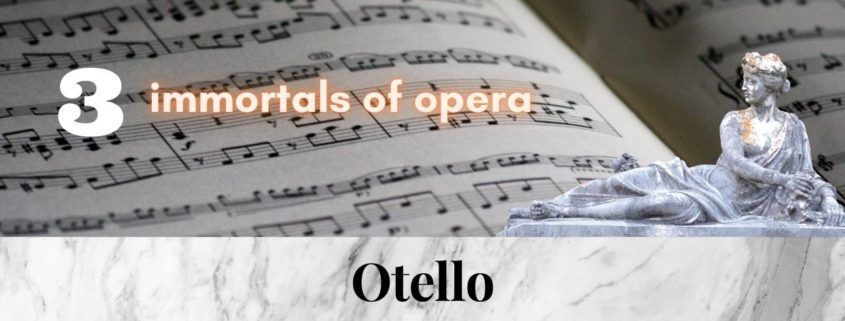This opera by Giuseppe Verdi is considered a congenial work on Shakespeare’s contribution to world literature. For many tenors, the role of Otello is the crowning achievement of their career.
The great love duet
Otello has heard the noise and appears. He sees that Cassio has injured the old commander Montano. He takes away Cassio’s captain’s rank and sends them all home. He remains alone with Desdemona, where he finds peace in her arms.
This love duet is one of the highlights of the opera. The two stand on the terrace in the evening and look out over the calm sea. Muted solo cellos introduce us to the romantic nighttime mood, and Desdemona is accompanied by shimmering harps. But Verdi does not compose a typical love duet, too much despair and drama are palpable. In the second part, Verdi creates a beautiful, almost Wagnerian theme with an urgent effect:
We will encounter this so-called “kiss motif” once again in the last act, among others in Otello’s death scene. The scene ends with flutes and harps, accompanied by strings.
Domingo captivates in this recording as an urgent and ecstatic Otello.
Già della notte – Domingo / Studer
The great Duet of Iago and Otello – Si, pel ciel
Synopsis: Now Othello is convinced of Desdemona’s guilt. He swears a solemn oath of revenge and Iago joins him.
In the oath scene you can still see the remains of the old Verdian Opera. In the style of a cabaletta, a fast one-strophic climax, Verdi composes the end of the second act. Before the oath the three famous “Sangue” shouts sound. In this scene one can musically observe how Otello has his own musical form at the beginning, but gradually adapts to Iago’s style of declamation until he falls into a mere imitation of Iago, a sign that Iago has gained complete control over Otello.
We hear this key scene in four different recordings.
Mario del Monaco was not a singer of nuances. So the opinion about del Monaco split. Nobody has sung the role so often on record. In this recording, “del Monaco is driven by an electrifying furor that stirs everyone up. The Si pel ciel is breathtaking, and their sangue screams even push the record listener into his chair – it’s the performance with which he sang himself into Otello Olympus.” (Fischer, great voices).
Si, pel ciel marmoreo giuro (1) – del Monaco / Warren
Otello’s inner drama
When Desdemona is gone, Otello collapses. The love for Desdemona was the most important thing in his life. His light of life is gone, his soul is eaten away and craves revenge.
The true drama of this work by Shakespeare takes place inside the characters. Otello must bring all shades of personality to life. Verdi requires Otello to constantly alternate between recitative, declamation and cantabile singing. The tenor’s score is strewn with constantly changing expression marks (piano, morendo, dolce, con espressione, etc.). “Dio mi potevi scagliar” starts in the pale tone of despair, goes on to a middle section in piano and ends in the fortissimo of “Ah dannazione”.
Verdi and Boito have the three main actors each call on God in a big scene. Iago’s Credo in Act 2, Desdemona’s “Ave Maria” in Act 3 and Otello’s “Dio mi potevia scagliar”. All three are portraits of the roles. While Iago represents the “evil” and Desdemona the “good”, Otello (in modern usage) is the “victim”, he becomes a resigned individual who mutates into an instrument of evil to destroy the good.
For many, Vinay was the archetype of Otello after Tamagno. Equipped with thick vocal chords, the Chilean tenor first sang as a baritone and then switched to heroic tenor. Otello was the role of his life, but he ruined his voice with Wagner roles. So was singing of Otello less than 10 years. The following excerpt is from the complete recording with Toscanini. Toscanini’s interpretation has a touch of the original. He was a cellist in the orchestra at the first performance in 1883 and later worked with Verdi as conductor of his works. Thus this recording has a historically elevated status. This complete recording is generally regarded as one of the greatest recordings in the history of opera.
Dio mi potevi scagliar tutti i mali (1) – Vinay








Leave a Reply
Want to join the discussion?Feel free to contribute!